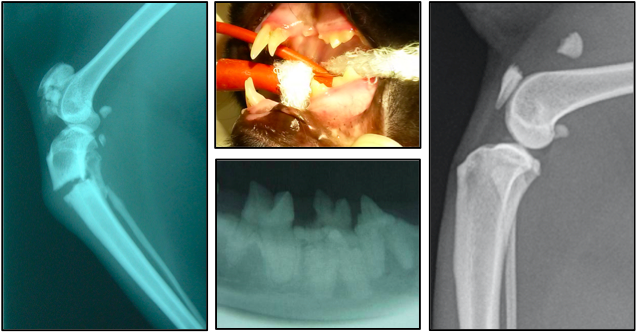Page 1: Patella fracture and Dental Anomaly Syndrome (PADS) in Cats
 Patella Fracture and Dental Anomaly Syndrome (PADS) (previously known as Knees and Teeth Syndrome (KATS) is a recently recognized entity in which cats often retain baby / deciduous teeth and also sustain fracture(s) of the patella (knee cap) without any obvious inciting cause such as trauma. In addition affected cats frequently go on to develop fractures in other bones, usually following the patella fractures, but sometimes before, and again without any apparent cause.
Patella Fracture and Dental Anomaly Syndrome (PADS) (previously known as Knees and Teeth Syndrome (KATS) is a recently recognized entity in which cats often retain baby / deciduous teeth and also sustain fracture(s) of the patella (knee cap) without any obvious inciting cause such as trauma. In addition affected cats frequently go on to develop fractures in other bones, usually following the patella fractures, but sometimes before, and again without any apparent cause.
What is the aim of his study?
The aim of this study is to ultimately identify the cause of this disease and potentially find better treatment options and/or preventative methods for ongoing fractures. We also want to discover the long-term outcome for these cats so owners can be informed about the prognosis. We would really like to have regular updates of all cats with this syndrome.
This survey has been designed in such a way that it can be completed again at a later date in case the cat´s condition changes or it develops more fractures. We just would like you to complete as much information as you can about your cat / patient.
Who is this survey for?
This survey is for owners / veterinarians of affected cats who wish to help contribute to the information on this condition and potentially help find a cause for this syndrome. We are confident that as more cases are reported and analyzed, the greater the probability of finding the cause and developing a possible treatment.
What is your involvement in this study?
Your involvement in this study will include completing a short questionnaire; you will be asked questions about you and your cat / patient and your involvement will remain anonymous. The anonymous data will be stored and used in accordance with the University of Bristol secure data handling policy. Only the researchers involved in this study will have access to the data you provide.
Follow up
Keep up to date with the latest news on this project by liking our Facebook page.
If you would like to know any further information or have any concerns about the study, please contact the lead researcher: sj.langley-hobbs@bristol.ac.uk